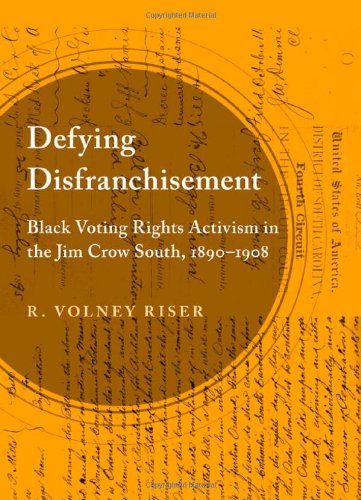

Most ebook files are in PDF format, so you can easily read them using various software such as Foxit Reader or directly on the Google Chrome browser.
Some ebook files are released by publishers in other formats such as .awz, .mobi, .epub, .fb2, etc. You may need to install specific software to read these formats on mobile/PC, such as Calibre.
Please read the tutorial at this link: https://ebookbell.com/faq
We offer FREE conversion to the popular formats you request; however, this may take some time. Therefore, right after payment, please email us, and we will try to provide the service as quickly as possible.
For some exceptional file formats or broken links (if any), please refrain from opening any disputes. Instead, email us first, and we will try to assist within a maximum of 6 hours.
EbookBell Team

5.0
18 reviewsIn Defying Disfranchisement, R. Volney Riser documents a number of lawsuits challenging restrictive voting requirements. Though the U.S. Supreme Court received twelve of these cases, that body coldly ignored the systematic disfranchisement of black southerners. Nevertheless, as Riser shows, the attempts themselves were stunning and demonstrate that African Americans sheltered and nurtured a hope that led to wholesale changes in the American legal and political landscape.
Riser chronicles numerous significant antidisfranchisement cases, from South Carolina's Mills v. Green (1985), the first such case to reach the Supreme Court, and Williams v. Mississippi, (1898), the well-known but little-understood challenge to Mississippi's constitution, to the underappreciated landmark Giles v. Harris --described as the ''Second Dred Scott '' by contemporaries--in which the Court upheld Alabama's 1901 state constitution. In between, he examines a host of voting rights campaigns waged throughout the country and legal challenges initiated across the South by both black and white southerners. Often disputatious, frequently disorganized, and woefully underfunded, the antidisfranchisement activists of 1890-1908 lost, and badly; in some cases, their repeated and infuriating defeats not only left the status quo in place but actually made things worse. Regardless, they brought attention to the problem and identified the legal questions and procedural difficulties facing African Americans.
Rather than present southern blacks as victims during the roughest era of discrimination, in Defying Disfranchisement Riser demonstrates that they fought against Jim Crow harder and earlier than traditional histories allow, and they drew on their own talents and resources to do so. With slim ranks and in the face of many defeats, this daring and bold cadre comprised a true vanguard, blazing trails that subsequent generations of civil rights activists followed and improved. By making a fight at all, Riser asserts, these organizers staged a necessary and instructive prelude to the civil rights movement.